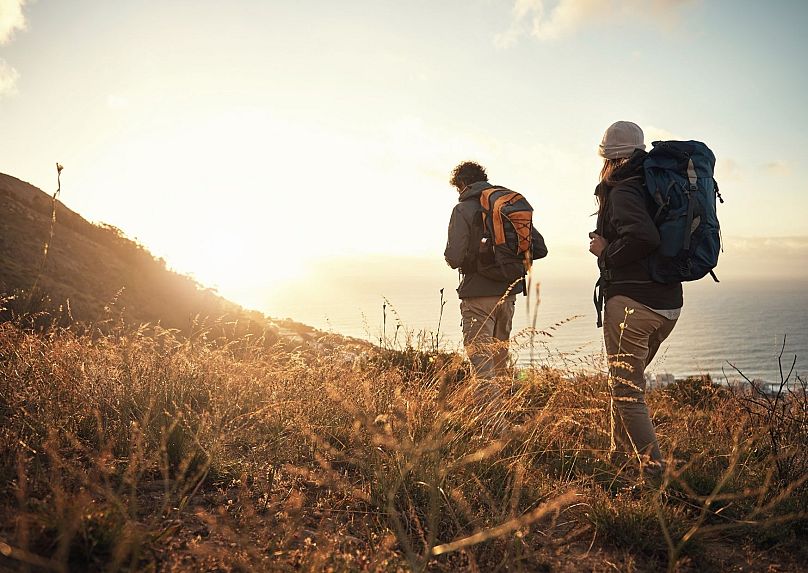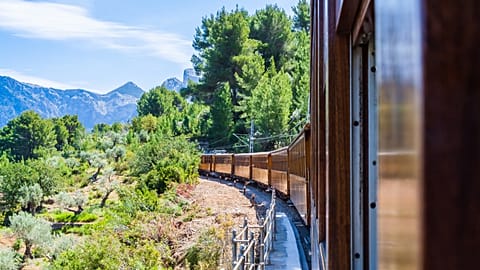Five travel experts on what travel will look like after the COVID-19 pandemic. Conscious travel, longer trips and engaging with local communities will all be travel trends from 2021 onwards.
Never has there been a year when understanding the future of travel has been more important. Which countries can you travel to right now? Will I have to take a COVID-19 test during my journey? How many times will I need to change my face mask on the plane? Euronews spoke to travel industry insiders about these questions, and the future of travel in 2021 and beyond.
 ADVERTISEMENT
ADVERTISEMENT
 ADVERTISEMENT
ADVERTISEMENT
It’s been an undeniably rocky road but it’s hoped that thanks to new air corridors opening up and better testing protocols, trips abroad will start becoming easier again.
Travel, of course, won’t be the same as it once was, but maybe that won’t be a bad thing. Cities will be quieter, UNESCO World Heritage Sites won’t be over-crowded and the skies will be less polluted. The planet has had a breather, and although the tourism industry has been suffering massively, the pandemic has taught us a vital lesson – that travel is a privilege and not a right.
Read our full report on the future of travel.
What is conscious travel?
After COVID, we predict the rise of the conscious traveller; this is someone who is far more discerning about the journeys they go on, willing and able to be away from home for longer (thanks to remote working), more appreciative of their surroundings and local people, and less reckless in their spending.
“I worked out that I must have spent over €22,000 on trips to Las Vegas over the past few years,” I overheard a young woman saying in the hair salon saying recently. “I have been six times and each time I had to pay for plane tickets, new clothes, hotels, booze, clubbing, everything. It makes me feel sick when I think about it.” She added: “In the future, I am going to travel far less, and really think about where I want to go – not just go with all my friends to the same place every year.”
While many of us desperately miss the freedom and excitement of travel, there is no doubt that there has been a realisation that travelling for social prestige and Instagram “likes” should not be what motivates us going forward. We have to choose trips that really mean something to us and are worth the effort and risk of making a journey to an overseas location (we predict the risk of catching the virus to be an ongoing issue for longer than we hope). So we have to adapt.
How will our travel habits change?
After endless months of cabin fever, there will be a universal hunger for wide-open spaces. In the US, for example, state and national parks have experienced huge influxes of visitors post-lockdown, and the trend is set to continue this year as time spent in the wilderness is felt to be an antidote to modern urban life. The point-to-point holiday, whereby travellers fly to a single location and then return home, will be rivalled by an emerging trend for trips that take in multiple locations, occur at a slower pace, and are as much about the journey as the ultimate destination.
As people think more carefully about the way they travel, they will seek out hotels and travel companies that are doing everything they can to minimise their impact on the planet. We can also expect accreditation to gain prominence, as consumers look for reassurance from legitimate “eco-tourism” certifications. We can expect beachgoers to be swapping sun and pina coladas for shade and coconut water. Even if visitors aren’t specifically travelling for a detox or bootcamp experience, they will want to book trips that leave them feeling better than before when they return home. Wellness tourism will be increasingly popular.
Engaging with local communities in a safe and respectful way will also be an important aspect of trips in the future, with tourists keen to learn and form human connections. We will also want to leave a positive footprint – to give something back – whether that is paying direct or volunteering.
Finally, as the idea of the “holiday” starts to feel anachronistic, simply “being” abroad will be the mindful alternative. This will manifest in the rise of 'workations,' where visitors combine work with vacations, embedding themselves for longer periods of time in a certain place.
What do the experts think? Here we speak to travel industry insiders about the future of travel in 2021 and beyond…
Brian Young, managing director, G Adventures: Far-flung destinations, but it's a no to big resorts
“We are seeing travellers being optimistic about long-haul options, opting for destinations such as Peru, Ecuador, Thailand and Costa Rica in 2021. Having their freedom to travel taken away has driven a shift in people’s mentality to take on those more challenging trips, which they may have put off in recent years. Trips such as Everest Basecamp have been consistently popular for 2021 bookings, while other challenging trips such as climbing Kilimanjaro and the Inca Trail have also seen a boost.
“Safety and flexibility will be front of mind. Following the turbulent changes in air corridors, and many travellers losing holidays this year, people will be looking for the reassurance that their booking will be protected if policies or restrictions change. G Adventures has launched a ‘Travel with Confidence Plus’ collection of tours, which feature increased physical distancing.
“With some travellers looking to minimise the number of tourists they come into contact with, we also anticipate an increase in demand for local, and smaller accommodation options. For many travellers, the opportunity to stay in one place through our Local Living tours, where the group stay in a traditional agriturismo in Italy or Croatia, or sleep aboard a catamaran for a week on a sailing trip, is a great alternative to big, busy hotels. With average trip durations for 2021 sitting at around two weeks, travellers are looking to have longer vacations, where they can get under the skin of a destination and have more local experiences.”
Pablo Caspers, Chief Travel Officer, eDreams ODIGEO: Escapism, but close to home
“The prolonged period at home during COVID-19 will continue to increase people’s sense of adventure and their search for escapism. Our global research shows that people have a strong desire to travel in 2021, with 70 per cent of people planning their break.
“A key trend that has started to emerge is the importance of familiarity to a destination, and this has translated to an uplift in short-haul travel. During summer 2020, with people seeking to stay closer to home, nine out of 10 Europeans chose a continental destination for their summer holidays, and this trend looks set to continue into 2021. Out of the 10 most booked destinations for Europeans next year, 60 per cent are within Europe.
“Travellers are understandably cautious and will be seeking assurance from governments and the travel industry about travel in 2021. Reviews are becoming increasingly vital, both online and by word of mouth, as people seek recommendations and reassurance about health and safety measures. Restaurants, hotels and tourist attractions that get COVID-19 precautions right, will see it reflected in visitor numbers. Meanwhile, the travel sector has launched COVID-19 insurance products to increase consumer confidence and governments are pushing forward with more rapid testing facilities in airports to provide quarantine free travel routes, which will be vital to boosting tourism throughout this year,"
Henry Cookson, founder, Cookson Adventures: Personal recommendations will be key
“There will be a wider shift towards more meaningful travel, centred around giving back to the planet. Out with the weekend getaways and in with family-focused itineraries for longer periods of time. There’s one key reason as to why this is important. There are many communities and conservation projects around the world that are completely reliant on tourism. Their income has completely halted due to the pandemic and many are concerned it will get to the point of no return.
As a response, we’ve launched conservation-centric experiences for our clients, such as tracking previously undocumented elephant herds in Angola’s unspoilt wilderness and supporting safari rangers in Botswana’s Okavango Delta. These are also remarkable opportunities to be the first to see wildlife and landscapes that have been left undisturbed over the past few months.”
Zina Bencheikh, managing director EMEA, Intrepid Travel: Climbing mountains and pushing boundaries
“In 2021, we know travellers around the world continue to be faced with varying levels of restrictions, and limited destinations they can visit. That’s why we’re focusing on how rather than where people will travel. We predict the rise of slow travel. The pandemic has forced us to slow down and many of us are not in a hurry to return to a fast-paced style of travel. This will often be closer to home, but we’re also seeing strong demand for all types of wilderness travel as people want to spend more time outdoors, from the Galapagos to Antarctica voyages.
“People want to get active on holiday and keep up the walking or cycling they enjoyed during lockdown. Many are also ready to tackle that challenge they’ve always dreamed of – Everest Base Camp trek was the second top-selling trip for Intrepid in September.”
Rebecca Masri, founder, Little Emperors: Tailored travel and longer stays
"Longer stay holidays are more popular in 2021 as travellers choose to 'work from holiday'. At Little Emperors we have already seen the average length of stay double from five to 10 nights. We are living in a world of digital nomads where people are working remotely more and more and don’t need to rush back to the office. Right now we are experiencing many ‘extensions’ on to hotel stays once people have already arrived.
“There has also been a shift towards experience-driven travel. People have been in their homes for months so now they want to discover new places, cultures, cuisines, landscapes, activities and reconnect with nature. Hotels have more wellness-focused stays and include specific programmes tailored to guests. Flexible cancellation policies will have a huge influence on traveller choice. It will be equally if not more important than price for some.”
Marco Corradino, CEO, lastminute.com: Travel smarter, but book the last minute
“Although holiday booking numbers are much lower overall than last year, when we look at the share of bookings at lastminute.com by lead time, the proportion of bookings departing within the week is 200 per cent higher than last year, as people evaluate the level of risk associated with each location. This ‘last chance’ mindset could have a potentially positive impact on the industry moving forwards, with people leaping to take advantage of opportunities as soon as they arise.
“Some EU destinations could see an uptick in visitors at more unusual times of the year, rather than a big concentration in the summer months – Kos and Cyprus have both experienced more than a 50 per cent hike in popularity since October last year, for instance. At lastminute.com, we’ve introduced measures that enable greater flexibility to accommodate this shift in behaviour, which we expect to continue for another year at least.
“COVID has had a severe impact on the global economy, which must be taken into account. But people will still go on holiday – they’ll just travel smarter. Lower risk locations that guarantee an easy return will be prioritised, and the classic seven-day holiday could become a thing of the past, with shorter trips becoming the norm going forward.”
Jenny Southan is editor and founder of travel trend forecasting agency Globetrender.

